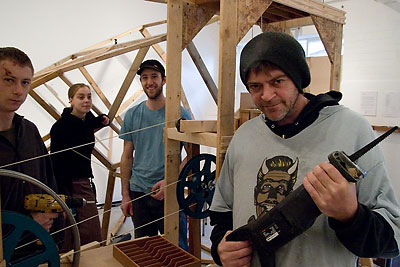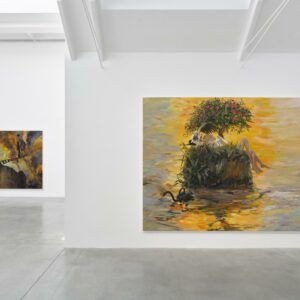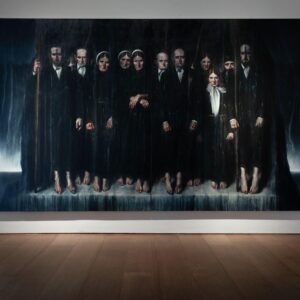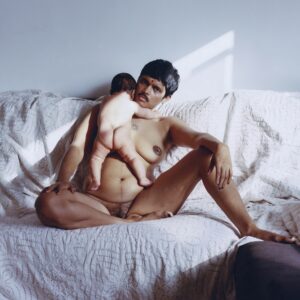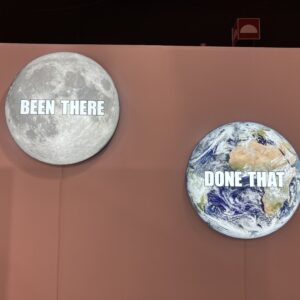Paul P Priestley (“Peep” to his friends) is one of the greatest artists working in the UK today. If you haven’t heard of him, this is not surprising: he does not court art market attention, works primarily for his own satisfaction, and his work has mainly been seen only by those lucky enough to stumble upon his small but crowded workspace within Sheffield’s BLOC studios. Inside, it is like something from the cabinet of Jan Svankmajer: deformed and cross-bred dolls and other toys form intricate tableaux and, if you are lucky enough to visit when there is enough sunlight to feed his creations’ solar panels, they come alive and move around the studio. But although on the surface his creations could be seen as dark toys and curious distractions, they are the outward signs of a vigorous intelligence, part of a body of work which (along with his series of anthropomorphised churches) seeks answers to recurring questions about the role of religion within the power structures of modern life.
His latest show, his first at BLOCspace, opens on Friday 1st December and continues until Sunday 17th December. The gallery’s website describes the show thus:
P. P. Priestley’s inaugural exhibition at Bloc fills both the gallery and the outside courtyard. His large-scale sculptures of anthropomorphised churches function as elegant formal sculptures, whilst simultaneously constituting the elements of an installation that presents a carefully constructed narrative. Left as basic wooden frames, these personifications of the Christian Church are stripped bare of their function and exterior trappings and appear to perform deviant acts. One lays crumpled in a heap in the gallery while another appears to be trying to climb the gallery wall. Priestley’s smaller works, constructed from parts of dolls and model animals, are presented in sometimes disturbing tableaux, juxtapose sado-masochistic, religious and bestial imagery.
Priestley’s use of automata has been prevalent in his work for a number of years. Using DIY mechanics he creates kinetic sculptures that often use solar power as an energy source. His sculptures contain archetypal and symbolic imagery: angels, winged horses, cherubs and demons. “Most of the work depends on what materials I can find to recycle at the time”, he says. “I’ve used windmills, waterwheels, bicycle pumps and hand-cranked generators – all my materials are things that other people have thrown away”.
FAD caught up with Peep on the eve of his show’s opening, and asked a few questions. Below are his answers (and a few from his technicians Brodie and Nick, who wandered in and out during the course of the interview):
FAD: When did you start to make art?
Peep: When I was a kid, when I was right young. My mother was an art-college hippy in the 70s and I took to it, my brother didn’t. So since I was about 4 or 5, as long as I can remember, I was going to go to art college.
FAD: How did you evolve into a professional artist?
Peep: I still don’t consider myself as a professional artist.
FAD: How much time do you devote to your art?
Peep: Well, my life really. I devote my life to it. If I’m doing paid work, it’s just to support me in making my art. I quite often dream about art…
FAD: Has that always been the case, since you were a kid?
Peep: Yeah.
FAD: What drove you to make art as a professional vocation?
Peep: I’m not a professional artist, but I do work as a technician, supporting other artists. I really enjoy it, I really enjoy getting new skill, honing my old skills, working with artists. (And the money’s great).
FAD: Explain your inspiration?
Peep: Explain my inspiration? Well, it’s just questions, questions about life. That’s my muse really, to answer some big questions about life. I’ll do my research, think about it…
FAD: Any particular questions that you’re focusing on at the moment?
Peep: Yeah, power.
FAD: What aspects of power?
Peep: Well, who do you say has the power in this country? [Pause]. That’s a question for you.
FAD: The establishment? The government? The Illuminati? Bildeborg?
Peep: The government: whose government is it?
FAD: It’s err… I guess the people’s government, supposedly.
Peep: It’s Her Majesty’s Government. Her Majesty’s Armed Forces. Her Majesty’s Prisons. Her Majesty’s Bank of England. And where does the Queen get her power?
FAD: Tradition, history…
Peep: Well, she’s the head of the Church of England. She gets her power through the One True God.
FAD: Divine rule? So you think that still has relevance?
Peep: Yes, more so, because it’s become subliminal. [Pause]. Does that answer your question?
FAD: No, it just sets off a whole load more questions…
Peep: Questions which I’ll be looking into in my work, exploring different tangents… it’s a never-ending process.
[Nick enters the room]
Peep: Nick here is going to do something to you if you ask a stupid question. That wasn’t a stupid question, by the way.
FAD: In what way does your inspiration transform into ideas? [Pause] Was that a stupid question? To rephrase, how do you transform your ideas into objects?
Peep: I just… make shit. That I like to think about.
FAD: From Ideas to production of art – how? And why? (Isn’t that the same question? I didn’t write these…)
Peep: To me it just seems like a natural process. In the same way that I keep making notes, I’m making notes about something only doing it in three-dimensional form.
FAD: Could your ideas be portrayed in any other medium? If so which?
Peep: Well, yeah. Really I’m a painter. I switched over to sculpture because I found it seems to have more resonance. Probably that has to do with my failings as a painter but… it just seems to have more resonance.
FAD: Do you still paint, or are you planning to return to painting?
Peep: Well, I consider myself a painter. In a way that’s what I’m still doing now, only with the sculptures you can think about stuff and move them around, put them in different positions, whereas with painting you have to paint things out to move it around. This is a lot quicker.
FAD: So, with sculpture you can configure it more once the objects are made?
Peep: Yes. I’m interested in different equations. Algebraic equations.
FAD: Which artists would you most like to blatantly rip off?
Peep: I’ll tell you which art dealer I’d most like to blatantly rip off, that’s Charles Saatchi. He still remains a dirty word in the North East. Two dirty words.
[There follows some discussion about the Saatchis, ending with:]
Peep: From what I understand Maurice and Charles are responsible for importing millions of backgammon boards into Britain in the early 70s, which is absolutely my favourite game. So there’s a chance that I might not have developed into a grand-master backgammon player without them.
FAD: When you say you’d like to rip off Charles Saatchi, do you mean you’d like to sell him something for a ridiculous amount of money, or…
[Peep’s explanation of what exactly he would like to do with Charles Saatchi follows, which cannot be published here for legal reasons]
FAD: Why is your art made?
Peep: I’m just realising a creative urge.
FAD: What does being an artist mean to you?
Peep: There’s a number of answers to that.
[Brodie walks into the room]
Peep: Can you ask Brodie that question first?
FAD: Brodie, what does being an artist mean to you?
Brodie: What does being an artist mean to me?
[There is a long pause, Brodie looks thoughtful and then picks up and unwraps a chocolate bar]
Peep: It means you can eat Breakaways before mid-day and not have to justify it to anybody.
Brodie: This is all I’ve eaten today. [Pause] No, I can’t answer that question.
Peep: What does being an artist mean to me? It kind of means… I think artists are better than… normal people.
FAD: Is that because you can follow your ideas and your inspiration?
Peep: Just, generally speaking, they’re nicer people. Kinder, more talented…
FAD: Do you think the process of art makes them better people, or do you think they’re better to start off with and that’s why they become artists?
Peep: I think it’s got to do with self-realisation. And I also think that someone working in a pizza shop, messing with the dough, can also be an artist in their field. I don’t think it should be limited to any specific medium.
FAD: But do you think it’s the work that brings on the realisation, or do you think there’s an element of that there already that makes them develop their work in an artistic direction. Are people born artists, or do they become artists through practicing art?
Peep: I think it can go either way.
FAD: Are you happy with your reasons for making art? i.e. Are there any trade offs that make life hard?
Peep: Yeah, everyone thinks you’re a… well, some of my more politicised friends and associates think it’s an entirely meaningless bourgeois enterprise. [Pause]. What was the question again?
FAD: Are you happy with your reasons for making art?
Peep: Oh, yes! More than happy. [Pause]. Except for… moments of doubt. When I think “what am I doing? Playing with dolls, painting pictures… when there’s shit going down in the world, people getting tortured and that…”
FAD: When does your art become successful?
Peep: I suppose when it functions for me.
FAD: Is that an entirely internal thing, or does it relate to how other people view your art as well?
Peep: It’s got more to do with your internal feeling than it has to do with anyone else.
FAD: What is art?
Peep: What is art? Well, Andy Warhol said “that’s a man’s name, isn’t it?” What is art? I dunno, I’ve got a book called that, it’s about that thick! [Indicates a pretty thick book].
FAD: Have you got a view?
Peep: [laughs]. Yeah, I live on the sixth floor; I’ve got quite a good view.
FAD: I mean… as far as I’m concerned, art is anything which somebody chooses to call art. Then you can go on to discuss whether it’s actually any good as art…
Peep: Yeah, yeah, I’ll go along with that. It’s… Warholian.
FAD: How do you start the process of making work?
Peep: I just start with a blank canvas, and stare at it until something comes, then fill it in. Or I start with… objects, I rearrange them, put them together, chop them up…
FAD: Do you start out with whatever object you have, or do you go out looking for specific things?
Peep: Well, it usually starts with research into something like the Cherubim, and descriptions of cherubim in the Old Testament – they’re fucking wild: four faces, six pairs of wings, feet on fire, terrifying to behold… and bearing in mind that they’ve got a very limited language at the time when the Old Testament was written, compared to what we have now…
FAD: Who prices your work? And how is the price decided upon?
Peep: Well, I don’t sell my work, but what I used to do, when I was younger, is to do free dealer art.
FAD: What do you mean?
Peep: Well, coming from the North East we’re all very skint, haven’t got a lot of jobs or a lot of money, and we liked to smoke weed, so what I’d do is I’d locate a dealer, find out some personal things about them, start making a painting that referenced these personal things, get them sucked in… and sell them for an ounce.
FAD: What is your next move, project, show etc?
Peep: Hopefully, if Brodie doesn’t chicken out from it, we’re going to recycle all the wood and screws and stuff from this present show and make a great big thing out of it.
FAD: What are the pros and cons of the art market?
Peep: No idea, I don’t deal with it.
FAD: Which pieces would you like to be remembered for?
Peep: Erm… [Long pause]… oh, erm, what, do you mean after I’m dead?
FAD: I guess so, and for the rest of history!
Peep: [laughs]
Nick: You haven’t got a big enough ego.
Peep: No, I don’t think I have.
FAD: Any routine in making your artwork?
Nick: I can answer that one. Gets up. Spliff. Coffee. That’s the routine.
Peep: And I take it from there.
Nick: That’s the only routine he has.
FAD: What has been the biggest break in your career?
Peep: Getting interviewed for FAD.
FAD: Who has been the biggest influence on you?
Peep: Biggest influence? [Laughs]. Nick!
FAD: Any others?
Peep: Just Nick really.
Nick: I don’t take enough credit.
Peep: I’ve done too many drugs. I’m a Brian Wilson figure. Nick more-or-less tells me what to do these days.
Nick: I live a life of purity so that he can be an errant genius.
Peep: It’s a symbiotic relationship.
FAD: How many artworks have you given away and to whom?
Peep: To my friends. Lots of them.
